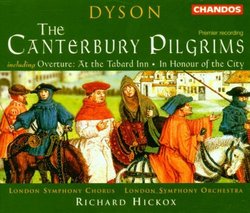| All Artists: George Dyson, Richard Hickox, Yvonne Kenny, Stephen Roberts Robert Tear, London Symphony Orchestra & Chorus Title: Dyson - The Canterbury Pilgrims · Overture ~ At the Tabard Inn · In Honour of the City / Kenny · Tear · S. Roberts · LSO · Hickox Members Wishing: 0 Total Copies: 0 Label: Chandos Release Date: 5/20/1997 Genres: Jazz, Classical Styles: Opera & Classical Vocal, Forms & Genres, Theatrical, Incidental & Program Music, Historical Periods, Modern, 20th, & 21st Century, Symphonies Number of Discs: 2 SwapaCD Credits: 2 UPC: 095115953129 |
Search - George Dyson, Richard Hickox, Yvonne Kenny :: Dyson - The Canterbury Pilgrims · Overture ~ At the Tabard Inn · In Honour of the City / Kenny · Tear · S. Roberts · LSO · Hickox
 | George Dyson, Richard Hickox, Yvonne Kenny Dyson - The Canterbury Pilgrims · Overture ~ At the Tabard Inn · In Honour of the City / Kenny · Tear · S. Roberts · LSO · Hickox Genres: Jazz, Classical
|
Larger Image |
CD Details |
CD ReviewsAnother gem from Chandos! K. Farrington | Missegre, France | 03/11/2000 (5 out of 5 stars) "To any lover of English culture, this combination is irresistible. Geoffrey Chaucer's position in our literature is assured for all time. With other immortals like Shakespeare, Milton, Spenser, Pope, Dryden etc., he is used by generations of schoolchildren to bring those dusty pages of history to life by sheer dint of his creative literary genius. The Canterbury Tales was written at the end of the 14th century as an English response to the nascent Renaissance on the continent, specifically writers like Dante, Bocaccio and Petrarch who produced works in the vulgar tongue like the Roman de la Rose and the Decameron. The backgound for the work is that a group of pilgrims travelling from Southwark to Canterbury tell one another tales to pass the time away. Although Chaucer's sources for many of his tales may sometimes have appeared from beyond these shores his Prologue and the ensuing descriptions of the 'gods plentie' are truly English to the core. This is the material that Dyson uses in this chorus and orchestra piece; he does not venture into the tales thmselves. Dyson uses his easy going, friendly style right from the beginning with his fanfare and the opening motiv, portraying the Tabard Inn at Southwark as the Pilgrims set out; you can almost see the flag fluttering in the April breeze. Chaucer's text has been translated into modern English by the composer and he brilliantly underpins every line of Chaucer's famous descriptions with colourful, tuneful music that never fails to interest with its mercurial invention. For example listen to the careful orchestration around the Knight with its glories of 'chivalrie' and its undertones of 'curtesie'. The bravery and warlike side is set off against the fact he bore himself 'as meek as is a maid', with a quiet conclusion, implying the warlike glories are of the past but he still has a great dignity. The spring like freshness of the young Squire is reflected in the scoring with flutes and light woodwind dusting the tenor soloist's line. This is a work that has been thought out and worked at for a long period. This CD was an Editor's Choice for the Gramophone and I can only humbly concur with their adjudication. A delight to listen to. Dyson does not use fake mediaevalism a la Korngold. He might use a little modal writing in 'the Nun' but this is pure twentieth century music showing the universal nature of the pilgrims, namely as 'types' we would recognise in our contemporary world despite the passage of six hundred years. This is not so much as what they do but as to how they are. For instance, we might not have a Pardoner anymore but we have charlatans who have taken up another profession with as much sanctimony as Chaucer's character. Hickox and Co are clearly enjoying themselves immensely and we can only but join in the fun. They must start playing this at concerts after this CD. Wonderful stuff!"
|

 Track Listings (9) - Disc #1
Track Listings (9) - Disc #1